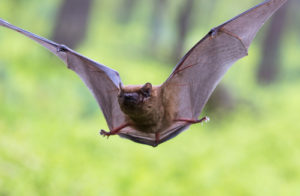
U.S. Rep. Pete Stauber (R-MN) led six of his Republican colleagues in questioning actions taken by the U.S. Fish and Wildlife Service (USFWS) that they say could negatively impact rural economies linked to the timber industry.
“We write to you today concerned that restrictions the [USFWS] added to the Lakes States Habitat Conservation Plans for bat species will not improve species recovery but instead unintentionally devastate rural economies,” the lawmakers wrote in an Oct. 6 letter sent to USFWS Director Martha Williams.
“Specifically, we are concerned that restricting timber harvesting and creating no-harvest buffer zones around trees during frozen conditions when bats are not present in the forests would be a detriment to family logging businesses who spur economic activity in rural communities,” wrote Rep. Stauber and his colleagues, who included U.S. Reps. Dan Newhouse (R-WA) and John Moolenaar (R-MI).
The lawmakers urged the USFWS to stop restricting the Lakes States Habitat Conservation Plans (HCP) for bat species and to instead let local experts manage the nation’s forests.
“State and local officials, and not the federal government, understand how to manage their wildlife populations,” Rep. Stauber said in a related statement. “New restrictions put forward by the USFWS are just another example of the federal government stepping over local officials.”
Rep. Stauber added that the very bat species being targeted by these restrictions are not harmed by sustainable forest management, nor is there any connection to human involvement regarding their primary threat, a disease that healthy forest management has been proven to help mitigate.
“The only result we will see from these misguided restrictions is devastation to rural economies and local family logging businesses,” said the congressman. “My colleagues and I urge USFWS, state and local leaders and industry to work together on the Lakes States HCP and avoid adding restrictions that could be economically and ecologically harmful.”
Several groups support the letter, including the American Loggers Council, the Federal Forest Resource Coalition, the Great Lakes Timber Professionals Association, the National Wild Turkey Federation, and the Forest Resources Association, among others.
In June, Rep. Stauber also sponsored the ESA Flexibility Act, H.R. 8136, which would amend the Endangered Species Act (ESA) of 1973 to provide for protective regulations when a species is listed as an endangered species, according to the bill’s text.
According to Rep. Stauber’s staff, H.R. 8136 would grant landowners leeway and the USFWS flexibility when dealing with endangered species listed under the ESA, including the northern long-eared bat. The bill remains under consideration by the U.S. House Natural Resources Committee.



